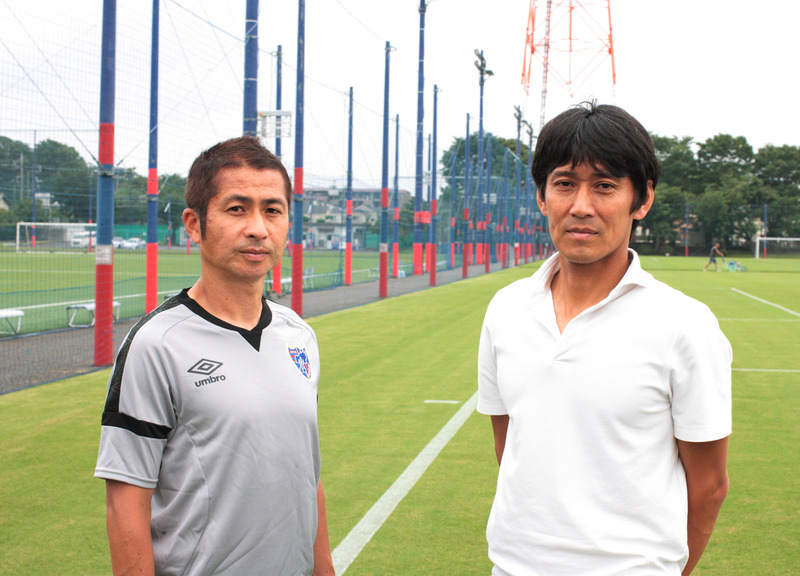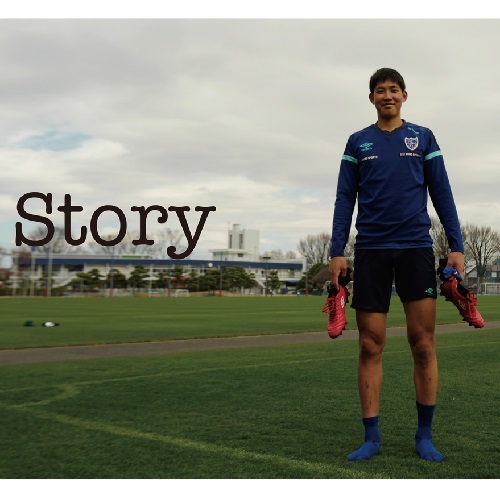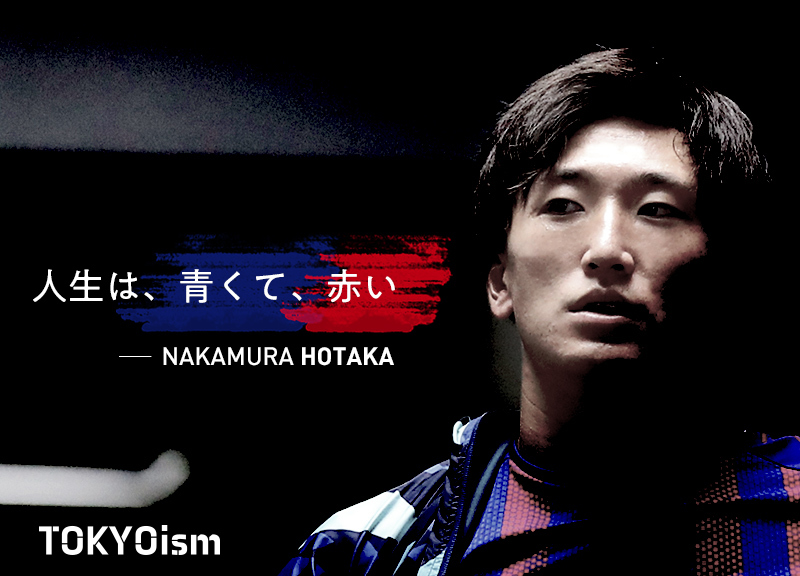Numbers 8 and 7 were always side by side. Ryuji FUJIYAMA and Satoru ASARI shared meals from the same pot and spent countless nights talking. Like blue and red, their personalities and playing styles were different, but they strangely got along well. In 1997, the motto "Aiming to be a strong and beloved team" was established. Let's look back on the footsteps of these two who walked together with those words.
A Self-Made Soccer Life
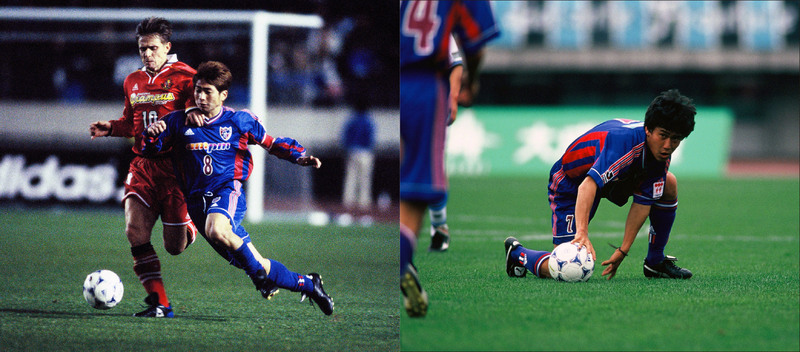
――Do you remember when you joined the Tokyo Gas Soccer Club?
Fujiyama “At the time, with the J.League set to launch the following year, I was someone who was not selected. There were few clubs, and for high school graduates, turning professional was a narrow gate. I couldn’t get in. So after graduating high school, my options were either to attend a university in Kyushu or to get a job. I took the exam and joined the Tokyo Gas Soccer Club in 1992.”
Asari “I went on to university after graduating high school, but I wasn’t that kind of player. I vaguely thought it would be nice to continue playing soccer after graduation. I had offers from J2 clubs, but since Tokyo Gas offered me a position as an employee-player, I joined in 1997.”
――What was the atmosphere like in the Tokyo Gas Soccer Club at that time?
Fujiyama "It's completely different from now (bitter laugh)"
Asari "But living in the dorm was fun"
Fujiyama "After practice, we used to collect 1000 yen each and have a lively time together"
――In 1997, the preparatory office for establishment was launched. Before that, Mr. Fuji (Fujiyama), who quickly switched to a professional contract, and Mr. Sari (Asari), who remained an employee player until the end of his active career. What were the reasons behind each of their choices and decisions?
Fujiyama "At first, I didn't have confidence in myself, but luckily I was allowed to play in matches from my first year after joining. That gave me confidence and made me want to aim higher. I participated in training with the Urawa Reds and explored other options, and in 1994, I received an offer from Tokyo Gas to sign a professional contract."
Asari "Since 1999, when the team became FC Tokyo, I was able to focus solely on soccer, and in terms of environment, I didn't draw a line between being a professional or an employee. Even though the team changed its name to FC Tokyo and the contract types were different, I did the same things as everyone else as a member of the team. At that time, Director of Development Tokuma SUZUKI (currently Representative Director and GM of Fagiano Okayama) told me that it wasn't necessary to switch from an employee player to a professional contract. Even as an employee player, I have continued playing soccer feeling grateful that I could concentrate on soccer in such an environment."
――Since joining the J.League, what have you valued the most?
Asari "Never giving up until the end and continuing to work earnestly is something I have upheld since my Tokyo Gas days. I have cherished that spirit. I believe I was a player who lived by that alone."
Fujiyama "Back then, fans and supporters were happy to see sliding plays along the sidelines, and we naturally understood what we had to do. However, there were also voices around us saying we should argue more, and the team at that time lacked that extra step of strictness."
Since our promotion to J1 in 2000, rivals have joined in the same position every year. Even so, what was the reason you survived until 2009?
Asari "Really, it was every year. When the off-season came, I thought, 'Is it my position again...? This year too...? I guess that's how it is.' It was a repeated cycle."
Fujiyama "But for both of us, there were special plays. On one hand, there were things that couldn't be changed, but on the other hand, I think we were able to change when necessary. I believe we were fortunate to meet coaches like Kura-san (Hisao KURAMATA, current Rikkyo University coach). That led to the birth of a center back who is less than 170 cm tall. To survive in this world, I think it was because I desperately searched for and established a way that only I could do."
Asari "Fuji-san's interceptions are truly amazing skills."
Fujiyama "Even that one play was something I desperately thought about and created to survive. That's why others can't imitate it. Sari's sense of balance and positioning are the same. Everyone has different senses, and it's about how to shape those into necessary weapons."
The Day Fuji and Sari Cried
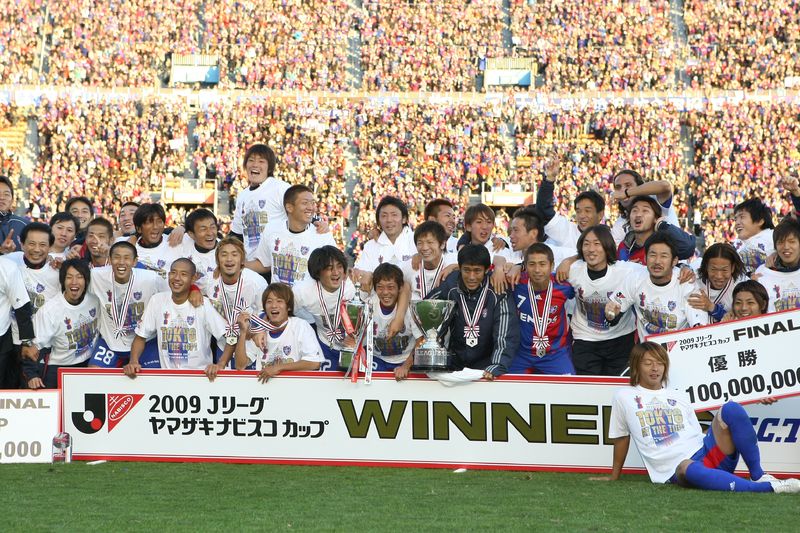
The journey they walked together, relying on each other. In 2009, their last year in Tokyo, the team won their second championship in the Yamazaki Nabisco Cup (now the YBC Levain Cup). On that day, after the award ceremony, Fujiyama took off his game shirt and slowly descended the stairs wearing the number 7 uniform underneath. After the match, Asari's tears and words, "I wanted to stand in that place together with Fuji-san," reflected the pride of a professional.
――Is there a season that stands out in your playing career?
Asari “The first year of promotion to J1 was stimulating and shocking in many ways. The opening match against Yokohama F.Marinos, where we barely won, is my greatest memory. That season, we defended well and the forwards worked hard to score. Until then, we could compete on equal terms with teams of similar strength using our own style of football. But after promotion to J1, we shifted to a style based on defense, with fast attacks utilizing the strengths of two or three forwards. Although it often didn’t work, especially in defense, we could at least feel some payoff from what we had been doing.”
Fujiyama “I was just going with the momentum around that time (laughs). To be honest, I only started listening to others around the age of 30.”
Asari “You were captain for a long time though (laughs).”
Fujiyama “I was only lifted up by others because I had been with the team for a long time. Personally, winning my first title, the 2004 Yamazaki Nabisco Cup Final against Urawa, was a turning point. It raised my value as a football player, and I felt that all my hard work had paid off then.”
Asari “I remember it too. (Due to injury) I was watching from the stands when Jean was sent off in the first half, and I thought Fujisan would come on. Because it was such a big stage and situation, I thought he would show more than usual, and that’s exactly what happened.”
Fujiyama “I was mentally prepared. Suddenly getting a chance and having to deliver results is something I had done every year. Maybe my body had come to react automatically in those moments. There was always a sense of crisis that if I didn’t perform on such a stage, the younger players would take my position.”
――In the final stages of their active careers, I have never seen either of them take a break from practice no matter how much pain they were in.
Asari “Fuji-san often laughed and said that he had inserted a suppository before practice today as well. That kind of thing was an everyday occurrence.”
Fujiyama “I really pushed my body hard. I tore my posterior cruciate ligament, forced myself to run in the summer, and was even taken away by ambulance. But that was also a way to show my commitment. To get playing opportunities, you can’t neglect that process. So, you have to be prepared to seize the chance when it comes. That was something I often talked about with Fumi-san (Fumitake MIURA, current SC Sagamihara manager). It’s no good to put effort in the wrong place, but if you don’t work hard, the chance will never come.”
Asari “I always thought I had less ability than others, so I felt I had to practice harder than anyone else. I also believed that to play in matches, it wasn’t enough to compete on the same level as others, and I think that was a big factor.”
— And behind the scenes of the 2009 Yamazaki Nabisco Cup victory, which was Tokyo's last year, Sari was excluded from the members.
Asari "It was in the locker room the day before the match when the registered members were announced, right? I remember Fuji-san comforting me, but I don't recall what he said."
Fujiyama "Rather than comforting, we cried together, didn't we?"
――That's the first I've heard of it.
Fujiyama "That's true. We've always been together, just the two of us, since we were young, and our families were close too. That's why I could feel Sari's frustration. I'm quite emotional myself (bitter smile)."
Asari "Because of that cup competition, I announced my retirement earlier, and from there, we talked about bringing momentum to the team together. So when I wasn't included in the lineup, I didn't know how to face the rest of my remaining playing days."
Fujiyama "There was pride involved, and since Sari had saved the team in crucial moments, I think he wanted to be there more than anyone else. I believe those tears were overflowing from what he believed in. It might have been the first time I saw Sari like that."
Asari "I was thinking of quitting the extra practice sessions the next day and the ones after that. Honestly, I wondered what all those years of playing were for. I was that down. People around me tried to persuade me, but I had already told the coach, 'I can't do this anymore.' Still, I don't clearly remember why I went to practice on the day of the final, but I think I paused and reconsidered whether my soccer career should end like this."
To Connect to the Next Blue and Red
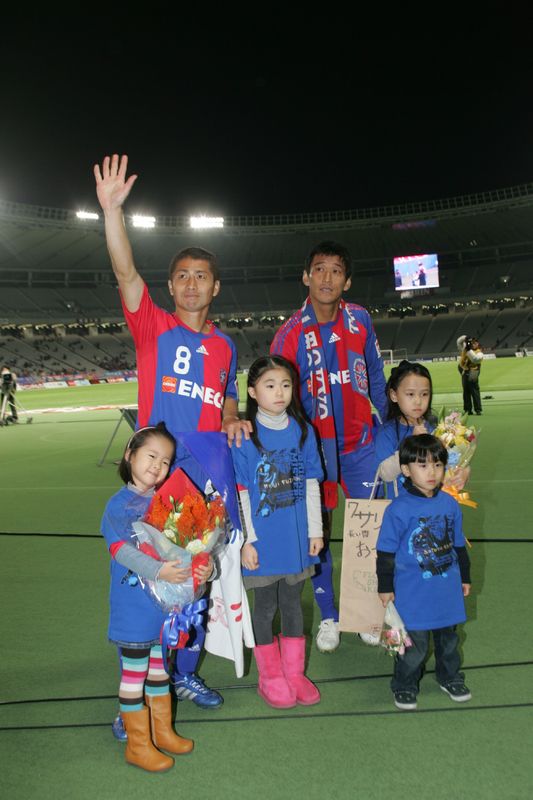
Having retired from active play and become part of history, the two are now working to nurture Tokyo's future. And they said, "We must learn more." Rather than imposing a fixed idea of "This is Tokyo," they repeatedly navigate through uncertain days to build new history on top of the accumulated past. Their appearance has not changed at all from their active days.
-- How was your active career wearing jersey numbers 8 and 7?
Fujiyama "It was over in the blink of an eye."
Asari "Since Fujisan was here from the moment I joined, I can't even imagine how I would have approached soccer if he hadn't been around."
Fujiyama "He was always there, a presence you could take for granted. He understood me, and I understood him."
Asari "Whenever Fujisan was doing his best, it made me feel like I had to practice harder too. Even when I injured my foot, Fujisan always said that the last moment is when you can no longer stand on the field. I've heard that if you give chances to younger players, you lose your place. So as long as Fujisan was around, no matter how much my foot hurt, I felt I had to stand on the field if I could."
Fujiyama "Having Sari by my side gave me a sense of security. Amaral (currently head coach of Tonan Maebashi) was the same. Even if we met now, it wouldn't feel nostalgic. We were a true family, so meeting again feels like seeing family or relatives. That's how much fun every day was."
-- How has the past 10 years been in your work after retirement?
Fujiyama "Now Sari is my boss (laughs)"
Asari "No, no (wry smile). I think the club has gone through various experiences and has changed. As a member of the development department, I focus on what I should put my energy into. Every day is a learning experience, and I believe this role is very important as it supports the club. Regardless of position, I am dedicated to working together with everyone to bring even one good player to the top team. I want to create an environment where coaches can work comfortably and build many things moving forward."
―― Mr. Sari still cherishes the paper with the club's guidelines created by Director Suzuki, right?
Asari "Even now, the development department is based on that guideline. On the occasion of the 20th anniversary, the club adopted the slogan 'Aiming to be a strong and beloved team,' which had long been used as a motto. This phrase has been around since the Tokyo Gas days, and both Fuji and I have grown up with that phrase. We want to make sure not to lose its essence and important parts. Especially for players in the development age groups, although they are students, we want them to act with Tokyo's pride and responsibility. However, there is still a lot that truly needs to be done."
Fujiyama "Honestly, right after retirement, I wanted to be involved with the top team, but now I think it was good to study step by step from the bottom. Since I experienced various categories as a player, that suited me. As Sari said, there is a mountain of things I need to learn. For example, even if I talk to middle school students about things I valued during my playing days, they can't fully understand. But that also comes back to me. What really struck me was the words from a coach I met: 'If the players can't do it, it's the coach's responsibility.' Even though I tried to convey the passion I valued during my playing days, it is a difficult era to speak harsh words. Still, with my parents' consent, there were times when I spent a whole day without kicking a ball, just talking. Truly, I have always struggled as a coach while moving forward. But a few years later, players started saying, 'I finally understood what you told me back then.' That made me very happy."
A Future Nurtured by Irregular Stones
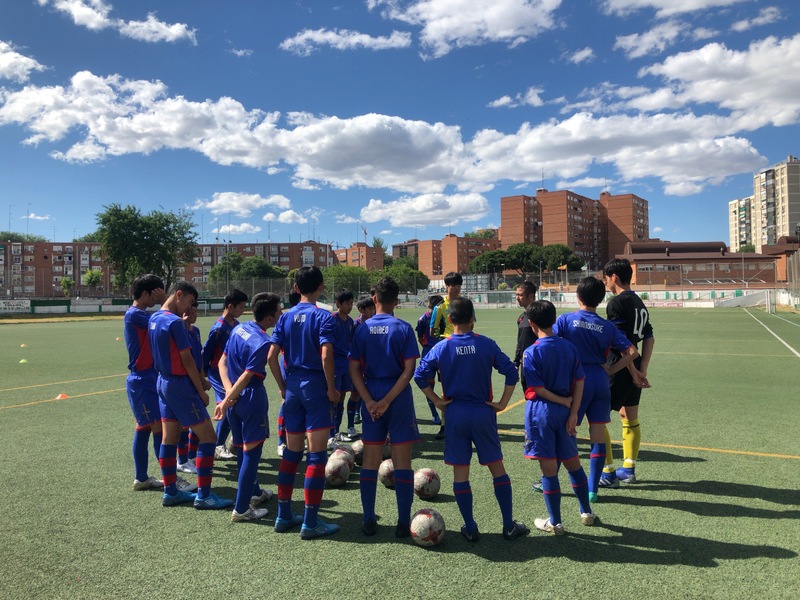
――Is there anything you consider important when facing each player individually?
Asari "The entire soccer world is now focusing on developing individuals. Improving basic skills and fundamental tactics, and how to demonstrate them in matches. Today's children are truly better than we were. However, no matter how skilled they are, it’s meaningless if they can’t perform in games. When I was a player, there were many things I couldn’t do as well as others. But I take pride in having unique strengths that others couldn’t imitate, which allowed me to continue as a player for a long time. That’s why, while filling in the gaps, we also try to develop our strengths. It depends on whether we can create strong points to survive as professionals. For that, awareness is also important. So, we need to nurture the ability to think for oneself. And the practical ability to put that into action is also necessary."
Fujiyama "Coaches in charge of each grade frequently hold individual interviews using the IDP (Individual Development Plan = mid-to-long-term ability development plan). This is a process of envisioning together what kind of player you want to become in the top team. Because you aim for this kind of player image, for example, what efforts you need to make over a three-month span. There, players and coaches discuss thoroughly. But this can’t work without a relationship of trust. Currently, the spread of the novel coronavirus has made training camps and expeditions impossible, which is a really big blow. The things we need to convey become fragmented, and it’s difficult to reach deep into their hearts. Players who overcome challenges and obstacles together and experience even small successes will definitely grow, so that’s our biggest concern right now."
Asari "Seeing Taichi HARA perform like that in the top team brings feelings of nostalgia and happiness. He kept practicing shooting steadily on his own and gradually became able to play in matches like that. Having players who think for themselves and take action like that influences those around them and has a positive effect on the whole team. Of course, we want genius-type players to emerge, but we also need to nurture players who can make efforts like that. As Fuji-san said, to foster the ability to think and the ability to put it into practice, I think it depends on how much we can support the players. I don’t have many opportunities to actually stand in a coaching role, but I want to work together with all the coaches, communicating and nurturing the players in front of us."
-- If the top team manages to win the J1 championship for the first time, I believe it will be a great achievement for the current players, but at the same time, it will also be a historic victory.
Fujiyama “What we were able to leave behind for the top team is definitely not much. I’d be happy if even a little remains, but more than that, right now we are doing what we can. For example, we also tell the kids that ‘there’s nothing to gain from losing,’ conveying the importance of fighting to win. First, we have to carefully nurture the hearts of each child we are involved with now. That’s about it.”
Asari “Development is truly difficult. That’s precisely why it’s interesting. Friends like Fuji-san and Miya (Masashi MIYAZAWA, current FC Tokyo U-15 Fukagawa coach) are doing their best to somehow send even one player to the top team. I want them to instill what only Fuji-san can do, and leave something with the players. If even one such player turns professional, they will become a player who supports the club. I look forward to that from now on.”
Fujiyama “I myself was never selected for the Japan national team, nor did I reach league championship. That’s why I want the kids to realize earlier and dream bigger. I sometimes imagine how much more fun it would have been if I could have played with more composure and playfulness during matches. However, we do not allow play with just the tips of the feet; players wearing this blue and red must fight with grit and dedication. On that fundamental premise, we want to develop players who are gritty yet playful. The unfulfilled dreams of league championships and the Japan national team, we entrust to them. We want them to carry that all the way to the top team. Nowadays, it’s said that the sense of belonging is fading, but to be strong and loved, we ourselves must love the club the most. There were flaws, but at least that was something the family back then had.”
Even though they are sifted every year, the irregular stones remain in the mesh, having survived fierce competition. They sweat it out, entrusting their rugged textured experiences, which are important in such a harsh world, to the future. Number 8 holds the dream of "one day standing at Ajinomoto as a coach" and passionately conveys all his heat to the children in front of him. At the retirement ceremony, number 7 expressed, "I want to make the club I love the best in Japan," and continues to spend his days learning. They, unchanged from their active days, aim for a team that is strongly loved and run earnestly on that single path.
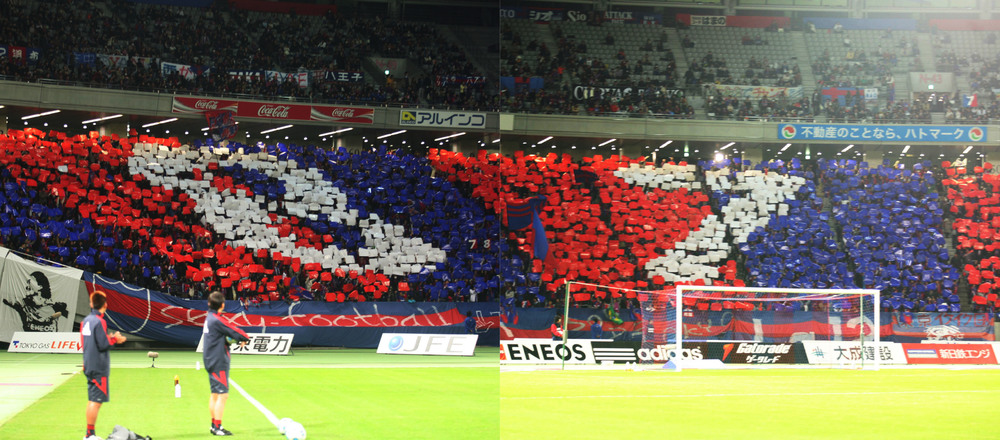
Ryuji FUJIYAMA Profile
Satoru ASARI Profile
Text by Kohei Baba
text by Kohei Baba
Photo by Kenichi Arai, Masahito Sasaki
Photo by Kenichi Arai, Masahito Sasaki
